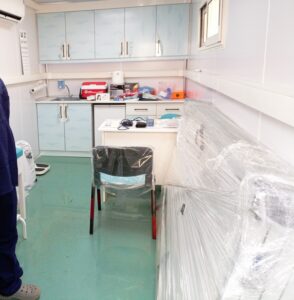The Nigeria Police Force on Thursday received 10 mobile medical clinics designed to improve the welfare and well-being of police officers, recruits, and trainers.
The clinic project was funded by the Government of the Republic of Germany and implemented by the United Nations Development Programme (UNDP) in collaboration with the Global Security—Sector Reform Foundation (GS-Foundation).
The facilities aim to ensure that officers and recruits have access to quality medical care as a way of prioritising their health and well-being as they undergo rigorous training
The Inspector General of Police (IGP) Mr Olukayode Egbetokun, thanked the development partners for their contributions to the ‘Supporting Police Reform Processes in Nigeria Project’.
“Your efforts have delivered transformative results and strengthened the partnership between the NPF and its stakeholders.
“The mobile clinics, equipped with solar power systems, advanced medical equipment, furniture, patient’s beds, and other essential resources for full functionality, will be stationed at various Police Training Institutions nationwide.
“This intervention builds upon the successes recorded in the reform project over recent years.
“In 2023, the delivery of a 2,000-bed capacity mobile barracks significantly alleviated accommodation challenges in our training schools,” he said.
Egbetokun said that more than 1,500 police personnel, including 600 instructors, had undergone advanced training in contemporary policing practices, emphasising human rights, ethical policing, and community engagement.
According to him, one of the challenges the NPF faces has been the inadequate funding for the upkeep of police infrastructure, leading to the deterioration of critical assets.
“This gap is being systematically addressed with the support of the Federal Government and the National Assembly as a legislative
framework is being deliberated to establish direct and sustainable funding for police training schools.
“This initiative will also empower our training institutions to manage and maintain their assets, and ensure that investments like these clinics continue to deliver long-term value, ” he said.
I-GP explained that the NPF had instituted a robust asset management system, including a comprehensive asset register.
He said the system enabled the police to monitor and manage its resources, effectively and ensured that they remain operational and impactful for years to come.
“Today’s milestone, therefore, reaffirms my administration’s vision and our shared commitment to a Police Force that is professionally competent, service-driven, and fully aligned with the principles of the rule of law.
“I want to assure our development partners and all stakeholders of the NPF’s unwavering commitment to their optimal utilisation, maintenance, and sustainability, ” he said.
Egbetokun, who was represented by the Deputy Inspector General of Police (Department of Training and Development), Frank Mbah, urged all stakeholders to sustain the noble efforts.
He said the impact of the reform project extended beyond policing as it would contribute to broader goals of security, economic growth, and national development.
Also, the Ambassador of Germany to Nigeria, Annett Günther, said that the handover exemplified Germany’s commitment to supporting NPF in its journey toward modernisation and improved welfare standards.
“By addressing the healthcare needs of police personnel, we are investing in the stability and security of communities across Nigeria, ” he said.
Also speaking, Ms Elsie Attafuah, the UNDP resident representative, said that the clinics were a testament to the power of partnership in delivering sustainable development.
“At UNDP, we believe that the well-being of individuals forms the bedrock of effective institutions. This initiative underscores our dedication to equipping the Nigeria Police Force with the tools and resources necessary for meaningful police services, “Attafuah said.
Similarly, Arno Langanke, a retired Commissioner of Police in Germany and representative of GS-Foundation stated that the mobile container clinics were a product of an intense procurement process that GS-Foundation was committed to.
“We are delighted that these clinics can now find their final destinations at the preselected police training schools to benefit both the NPF and the local population at the respective locations.
“We are confident that this project will significantly to improve healthcare and emergency care in police training schools and surrounding communities,” Langanke said. (NAN)
























